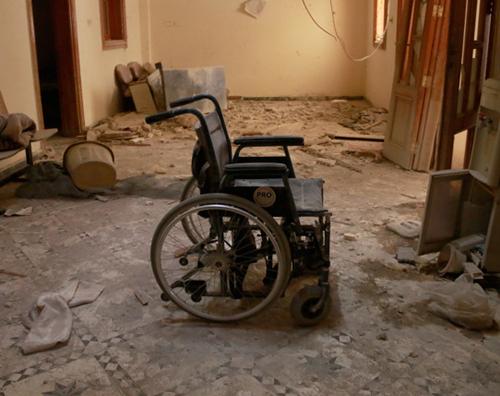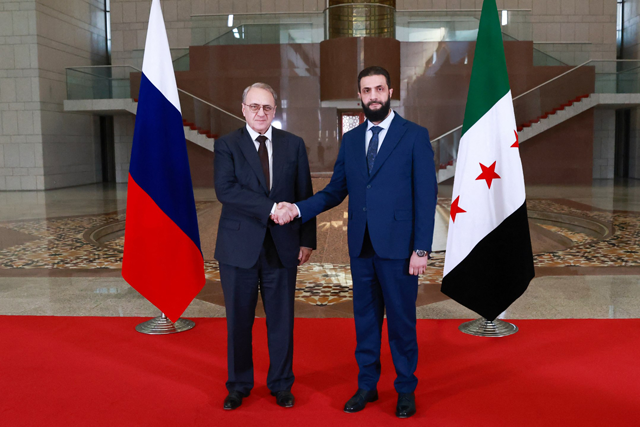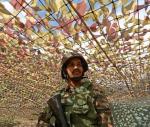You are here
Russia fighting in Syria for a year, still at odds with US
By AP - Oct 01,2016 - Last updated at Oct 01,2016

A wheelchair is seen inside the Sahra Hospital after a reported barrel bomb strike by Syrian regime forces over the Sahur neighbourhood of Aleppo, Syria, on Saturday (Anadolu Agency photo)
WASHINGTON — A year after Russia waded into the war in Syria, aiming to flex its national security muscles and prop up beleaguered Syrian President Bashar Assad, Moscow appears no closer to one of its military goals: getting the US to cooperate in the skies or on the ground in the civil war, and prospects for a diplomatic resolution seem dim.
The yearlong offensive of air strikes and ground combat in Syria, however, has showcased some of Moscow's newer military capabilities and underscored President Vladimir Putin's willingness to go to war to protect an ally — particularly one that hosts a critical Russian base on the Mediterranean Sea. More broadly it put Russia at the centre of the conflict, which provided an opening for diplomatic cooperation between the US and Russia to end the civil war. But it also further complicated the US-led campaign to wipe out Daesh militants who created their safe haven amid the chaos.
The diplomacy was collapsing this week with the US threatening to end all Syria-related cooperation unless the bombardment of Aleppo stopped and Russia responding that the US was encouraging extremist attacks on Russian assets.
For its part, Russia has demanded that the US separate the anti-Assad rebels it has supported from Al Qaeda-linked militant groups, who often intermingle. But the US has been unable to do so, and instead has said it remains focused on defeating the Daesh terror group in Syria.
The bickering and diplomatic stalemates have threatened to stymie other US-Russian issues, such as economic sanctions or the annexation of Crimea.
As members of the Senate Foreign Relations Committee on Thursday demanded to know what the Obama administration's "plan B" was for Syria, Deputy Secretary of State Antony Blinken laid out the administration's view of Russia's position.
"The leverage [the US has] is the consequences for Russia of being stuck in a quagmire that is going to have a number of profoundly negative effects," Blinken said. Among them, he said, is that Russia will be seen throughout the world as complicit with Syrian President Bashar Assad as well as with Hizbollah and Iran "in the slaughter of Sunni Muslims", the country's largest religious group.
Under blistering criticism from senators, Blinken said the administration was "actively considering other options" for how to end the bloodshed. The civil war in Syria has cost 500,000 lives and caused the worst refugee crisis since World War II.
A year ago, worried about its naval base on Syria's coast and determined to shore up Assad, Moscow began to build up its military in Syria, sending in equipment, aircraft, fighter jets and troops.
Against a backdrop of an early failed US programme to train moderate Syrian forces, Putin began launching air strikes in Syria on September 30, 2015. Moscow insisted that it was targeting Daesh extremists. But in the ensuing months, the Russian air strikes have pounded rebel strongholds and civilians, largely in areas where there is no Daesh presence. According to US and coalition officials, as well as humanitarian groups on the ground, the Russians have bombed hospitals, schools and recently a US aid convoy, killing throngs of innocent civilians either deliberately or inadvertently, because of their use of powerful but imprecise "dumb" bombs.
Concerned about safety in the increasingly crowded skies over Syria, the US set up a communications link with Russia to de-conflict the airspace and reduce the risk of collisions. That minor cooperation will continue even if the prospects of other cooperation are ruled out.
According to US officials familiar with the discussions, the Russians made it clear to the Pentagon from the start that a key long-term goal was joint military coordination with the US — a move military officials and others stridently opposed.
Russian leaders, said one senior US official, had a singular focus during the talks with defense officials and that was to be able to project themselves as military allies with the United States.
The official was not authorised to discuss the issue publicly so spoke on condition of anonymity.
Senior Russian officials from Putin on down have said that Russia got involved in Syria to prevent the country from slipping into complete chaos and to combat terrorism.
Russia hoped to be able to shift the main focus from Ukraine to Syria in Russia-West relations and make itself an indispensable player in Syria, Russian officials have said.
"Putin had several objectives entering into Syria; one was to demonstrate Russia is a global power," said Evelyn Farkas, a former US deputy assistant defence secretary who is now a senior fellow at the Atlantic Council in Washington. "He needed to show his people that Russia is an important nation."
But last week, the negotiations to set up a joint military implementation centre collapsed, and it became clear that Russia was not going to make good on its publicly stated effort to control Assad or force the government to abide by the ceasefire.
"I think this has proven to be tougher than the Russians expected," said Derek Chollet, a former assistant defence secretary for international affairs and now a senior adviser at the German Marshall Fund. "I see no evidence that Russia's intervention in Syria is increasing its diplomatic or political influence" around the world.
"In fact, if anything, what I've heard from Europeans is that the intervention in Syria last year was so shocking in its brutality that it quashed any sort of momentum there was to lift sanctions against Russia in Ukraine," he said.
Meanwhile, the fighting, according to experts, has revealed an array of technological and strategic weaknesses within Russia's military and its command structure, including its lack of precision targeting, a cumbersome decision making process and, at times, limited real-time awareness about what is going on at the battlefield.
The US-led coalition has also had its share of mishaps on the battlefield, including an air strike that mistakenly hit dozens of Syrian soldiers just as the cease-fire began earlier this month — plunging the talks into turmoil.
Russia's military campaign in Syria, however, did allow Moscow to showcase in combat for the first time its long-range cruise missiles, launched from the air and from the sea.
Related Articles
BEIRUT — Russia's military build-up in Syria is aimed mainly at propping up President Bashar Assad and helping him reinforce his threatened
DAMASCUS — Syria's new leaders said Wednesday they had discussed "transitional justice" with the first Russian official delegation to visit
OCCUPIED JERUSALEM — Russian troops have arrived in Syria to aid Bashar Assad's beleaguered government in the battle against Daesh militants
















